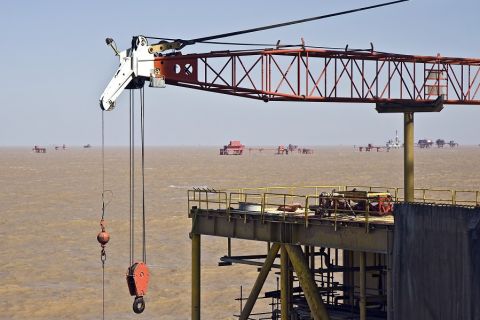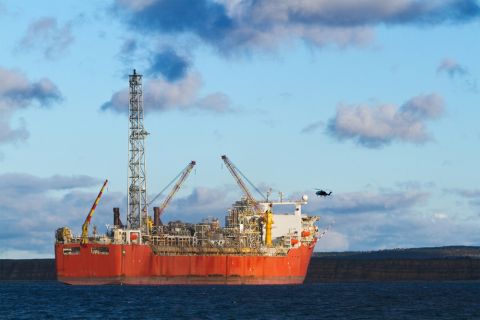The race to prove the worth of thermoplastic composite pipe for subsea operations is heating up.
Magma Global has just signed a joint development agreement with BP and Subsea 7 in a project to qualify its carbon fibre m-pipe as part of the next generation of subsea pipelines.
Rival Airborne Oil & Gas’s thermoplastic composite pipe flowline has been undergoing qualification offshore Malaysia for the past three years and is due to be used in a pilot project there next year.
The 550-m, 6-in. flowline is to be installed in 30 m of water and will connect two platforms located on the West Lutong (SEN 32/11) Field.
The oil and gas industry has widely adopted the use of composites in a variety of applications over the past 20 years, including onshore production piping, fire water pipe and repair, and protection of structures.
The increasing demands on materials to meet future technical requirements for risers, intervention lines, spools and components such as stress joints has led the industry to take a closer look at composites for these more demanding subsea applications.
The Magma qualification programme, which runs for 30 months, targets 6-in. to 12-in. pipes for risers and jumper systems for deepwater environments and includes laminate testing, single load tests (tensile, burst, collapse, bending, torsion, compression, impact) and combined load tests (axial bending, collapse bending, pressure bending and axial pressure bending).
The programme also is supported by the National Composites Centre and Innovate U.K, the government initiative established to support pioneering technologies in the energy sector.
Magma’s m-pipe is a high strength, lightweight, corrosion-resistant, fully bonded, composite thermoplastic pipe, which is stronger than steel and traditional flexibles, and is typically one-tenth the weight.
Magma said, “The high specific strength and corrosion resistant nature of composite technology makes it ideal for the oil and gas industry where deepwater environments and corrosive fluids challenge the integrity of steel structures.
“Manufactured from highest quality carbon fibre and PEEK polymer materials, m-pipe is immune to corrosion and is suitable for a wide spectrum of fluids and gases.”
The hope is that the results will lead to lighter and more cost-efficient riser systems than currently exist to help reduce the costs of deepwater field developments, and in particular those with corrosive fluids.
Similarly, jumpers or spool pipes which are subject to exceptional cyclical loads will be easier and less expensive to design and install, and will be more reliable to service.
In addition, the qualification programme will deliver the necessary inspection techniques to verify the long-term integrity of the systems.
Magma Global is based in Portsmouth, U.K., and is currently expanding its capacity to meet growing demand for risers, jumpers and intervention lines.
New JIPs launched
Meanwhile, DNV GL also is launching two joint-industry projects (JIP) to investigate affordable composite components for the subsea sector and qualify technology for more efficient linepipe production processes. It is estimated that the JIPs could deliver a combined saving of £6.75 million (US$ 10.4 million).
The DNV GL Affordable Composites for the oil and gas industry JIP aims to reduce the cost of qualifying composite components for subsea use by replacing large-scale tests with “certification by simulation.”
Statoil, Petrobras, Petronas, Nexans, Airborne and the Norwegian University of Science and Technology in Trondheim, Norway, are participating in the project. The project is partly funded by the Research Council of Norway.
The project, which could potentially deliver a 40% to 50% cost saving for certification and qualification of subsea composite components, will seek to validate new advanced material models by experimentation, with the main focus on predicting chemical ageing.
“Composite components require full-scale testing to document long-term properties to achieve certification,” said Jan Weitzenböck, principal engineer, DNV GL—Oil & Gas. “A typical qualification campaign for a subsea composite component can cost in the region of 10 million NOK to 100 million NOK (US$ 1 to 12 million). The results of this JIP could potentially save up to 16 million NOK (US$ 1.9 million) for recertificaiton of existing components.”
Recommended Reading
Oceaneering Won $200MM in Manufactured Products Contracts in Q4 2023
2024-02-05 - The revenues from Oceaneering International’s manufactured products contracts range in value from less than $10 million to greater than $100 million.
E&P Highlights: Feb. 5, 2024
2024-02-05 - Here’s a roundup of the latest E&P headlines, including an update on Enauta’s Atlanta Phase 1 project.
CNOOC’s Suizhong 36-1/Luda 5-2 Starts Production Offshore China
2024-02-05 - CNOOC plans 118 development wells in the shallow water project in the Bohai Sea — the largest secondary development and adjustment project offshore China.
TotalEnergies Starts Production at Akpo West Offshore Nigeria
2024-02-07 - Subsea tieback expected to add 14,000 bbl/d of condensate by mid-year, and up to 4 MMcm/d of gas by 2028.
US Drillers Add Oil, Gas Rigs for Third Time in Four Weeks
2024-02-09 - Despite this week's rig increase, Baker Hughes said the total count was still down 138 rigs, or 18%, below this time last year.




